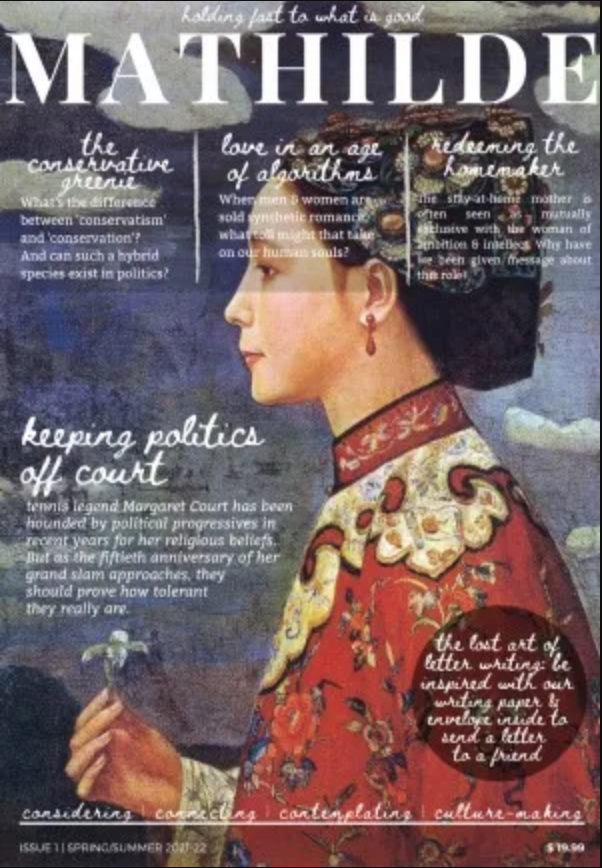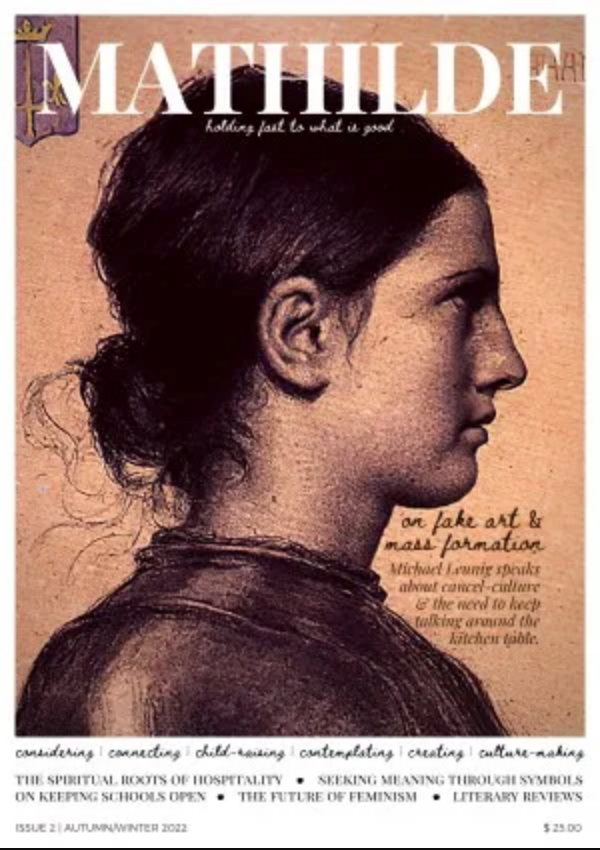Veronika Winkels
mercatornet.com
Veronika Winkels is married with four young children. She majored in History and History & Philosophy of Science at the University of Melbourne before becoming a freelance writer, published poet, and sometimes-printmaker. Lately she spends more of her time child-wrangling. She is the founding Editor of Mathilde magazine.
What does a millennial woman do when the culture her kids are growing up in seems finally to have flipped its lid? Round up her friends and start a new magazine, of course. That’s what Melbourne mother of four and occasional MercatorNet contributor Veronika Winkels did. Here she talks to us about Mathilde (battle maiden) and its mission.
You have four young children. What possessed you to take on something as consuming as publishing a 100-page, print magazine, even if only twice a year?
I began the project in lockdown, as a creative outlet I could do from home. It definitely helped get me through 2021, drawing together a few straggly talents and passions.
One of those passions is the truth about men and women. I was nursing my then-newborn last year, and scrolling the news on my phone. I came across a report on politically correct discussions in the British Parliament about discrimination based on sex and gender. Hearing a minister argue that the term “breastfeeding mother” discriminated against transgender people and should be changed to “chest-feeding person” was the last straw for me. And so Mathilde was born.
Since then, a whole range of incredible people have come into the conversation. Still, I think I must be a bit of a glutton for punishment. Life’s pretty busy!
If it was a negative stimulus that got you started, positively what is Mathilde offering women? Is there an untapped market for these ideas?
Our aim is to celebrate the best our Western civilization has produced and to build upon it. We are where we are today because we stand on the shoulders of giants, and I think we dishonour our heritage and our forebears by seeking to extinguish its memory and legacy. I think it also shows a kind of cultural arrogance and aggression.
We’re not sentimental about the past—it had plenty that needed changing – but throwing the baby out with the bathwater is not a solution. The conversations I’ve been having around Mathilde, and the feedback from places I didn’t expect, seem to confirm we’re not alone in thinking this. We sold out our first issue, and the momentum is still building into our second issue. So, I think there are plenty of people who feel the narratives approved by our governments, media and pop culture have grown limited or stale, and who are open to alternatives.
The first issue (Spring/Summer 2021-22) features an interview with Australian tennis legend Margaret Court – now a dark legend in the eyes of progressives for her public defence of traditional marriage. How significant is her story in terms of Mathilde’s mission?

I was curious to hear her side of things, and how she felt she had been treated by the media in recent years. I think most people, whether they agree with her views or not, could intuit that she hadn’t been fairly represented. Her renown as a sportswoman, as well as her community efforts now, were being passed over because she doesn’t go along with the new political narrative about marriage. Her case is a perfect example of our failing ability to respect a person, even when we do not agree with them.
We’re not setting out to play the provocateur with Mathilde, but we’re not going to shy away from prickly and controversial topics if we think they’re important, or to test whether the popular values of tolerance and diversity are really being honoured in our society.
Before even opening the first issue I was impressed by its beautiful covers. It looks very attractive on the coffee table. You have gone to some trouble to make the magazine a work of art. What’s the message in this?
That happened naturally. We are exploring the cultural goods of the Western tradition and art is, of course, a huge part of that. Just think of the Renaissance, and that’s only one period in millennia of artistic endeavour. Images can be so powerful. Yet many incredible works of art have fallen into oblivion. The old styles are largely out of fashion—they’re not loud or excessive or shocking enough. We discussed this in our first issue.
The artworks we’ve used also provide a certain pace to the magazine, balancing the substantial articles with a visual pause. In fact, cartoonist Michael Leunig spoke with us about the importance of art. An interview with this Australian Living Treasure appears in our second issue, out this month.
On a deeper level, if Dostoevsky is right, and I think that he is, that “beauty will save the world,” the visual arts have an obvious role to play. Beauty complements two other transcendentals, Truth and Goodness – ideas that have deeply influenced the Western philosophical and cultural tradition. But without beauty to illumine them, they do not realize their full meaning and purpose. Our tagline, “holding fast to what is good”, draws on these ideas.
Despite the continuing mainstream use of the term “feminist”, the word “feminine” seems to be shunned. Yet Mathilde, in its appearance particularly, evokes the feminine – is that a concept you embrace?

Definitely. We don’t pander to the idea that, to shed our historic bondage, women need to forfeit their distinctly feminine spirit and genius. Unfortunately, the feminine has become conflated with the ditzy blonde stereotype. This was something Marilyn Monroe played to, despite her impressively high IQ. But there is nothing inherently weak-minded and subordinate about being feminine. Women should not feel they have to masculinize themselves just to be taken more seriously by society.
Is it significant that Mathilde is printed on recycled paper and that the opening article in your first issue asks whether one can be both conservative and “green”? In what sense do you embrace the word “conservative”?
The word “conservative” has been so bogged down in politics that I hesitate to call us a conservative magazine. If we are, it is in the sense we are trying to conserve something we strongly feel is in need of protecting. From our natural environment to our cultural one, something lost might be impossible to recover ever again. That’s tragic— from a rare bird or plant species to the Cathedral of Notre Dame.
The scope of your articles is quite broad: topics range from conservation to contemplation, from trips to the op-shop and art gallery to social projects for rehabilitating mums who are drug addicts, and for feeding the world’s poor; then there’s home-making, Christianity – and an incentive to take up the lost art of letter writing… What’s coming up in the next issue?
Culture is like a tapestry made up of so many different threads, working in together. Everything is connected. The game and the glory is to find out how.
Our next issue’s theme is openness, and we chat to Tim Berryman, who fell out of favour with the Victorian Government because he kept his independent school open during lockdown last year. We discuss the importance of free speech and resisting mass formation with Michael Leunig, and the perils of questioning identity politics with Melbourne University professor, Holly Lawford-Smith. We explore the forgotten duty of hospitality, celebrate the continuing legacy of Joan of Arc, pay tribute to Klimt, and much more. But you’ll have to buy a copy (which is out now) to find out the rest.
*You can order a copy of Mathilde through the website at mathildemagazine.com

